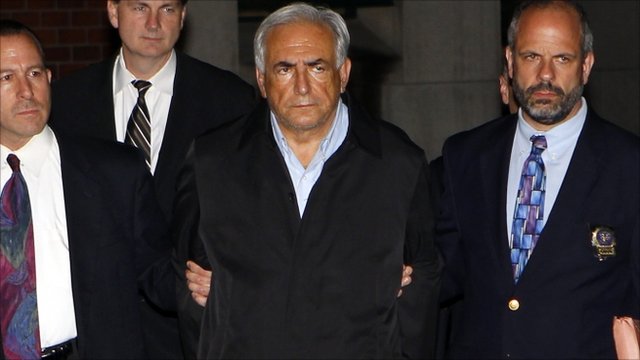 IMF head Dominique Strauss-Kahn's troubles are mounting, 24 hours after he was charged with attacking and attempting to rape a hotel maid.
IMF head Dominique Strauss-Kahn's troubles are mounting, 24 hours after he was charged with attacking and attempting to rape a hotel maid.Mr Strauss-Kahn, who is set to appear at a New York court on Monday morning, denies the charges.
His court hearing was delayed to allow forensic tests to be carried out.
Now French writer Tristane Banon, 31, has indicated she is considering filing a complaint of sexual assault over a 2002 incident, her lawyer says.
The European Union says the scandal surrounding Mr Strauss-Kahn should not affect bail-outs for eurozone countries.
The IMF (International Monetary Fund) has played a central role in organising rescue packages for the troubled economies of Portugal and Greece.
Allegation resurfaces
Ms Banon says she was assaulted by Mr Strauss-Kahn when she went to interview him for an article she was writing.
"We're planning to make a complaint. I am working with her," Ms Banon's lawyer David Koubbi told the AFP news agency. Mr Strauss-Kahn's lawyers have so far not responded to the allegation.
According to Ms Banon's version of events, Mr Strauss-Kahn said he would only speak to her if she held his hand.
He then touched her more and more intimately, and in the end she had to fight him off, she said.
Ms Banon's mother, Anne Mansouret, herself a politician from Mr Strauss-Kahn's centre-left Socialist Party, said she persuaded her daughter not to file a complaint at the time.
"I just want to say that the only reason she didn't press charges at the time is because I convinced her not to, because I thought it was better for her," Ms Mansouret told French state TV.
Ms Mansouret says she now regrets this advice.
Ms Banon raised the allegation in a TV discussion programme in 2007, but Mr Strauss-Kahn's name was bleeped out during the broadcast.
Forensic tests
Mr Strauss-Kahn, 62, underwent medical examinations on Sunday. Police were looking for scratches or any other evidence of his alleged assault on a chambermaid at the Sofitel hotel in New York on Saturday afternoon.
He was arrested on board an Air France flight from New York to Paris later on Saturday. He was kept overnight in a special unit for sexual harassment in the district of Harlem.
On Sunday, he was charged with a "criminal sexual act, unlawful imprisonment and attempted rape". Police say the 32-year-old woman who made the allegations has formally identified him in a line-up.
He had been scheduled to meet German Chancellor Angela Merkel on Sunday in Berlin and then attend an EU finance ministers' meeting in Brussels on Monday to discuss the Greek and Portuguese bailouts.
The IMF is based in Washington DC but Mr Strauss-Kahn is believed to have been in New York on personal business. He was staying in a hotel suite which costs $3,000 (£1,854) a night.
He does not have diplomatic immunity, a New York police spokesman said.
The IMF head is due to appear before a Manhattan court on Monday for arraignment.
"He intends to vigorously defend these charges and he denies any wrongdoing," lawyer Benjamin Brafman said.
Until he was arrested, Mr Strauss-Kahn was considered a frontrunner to become the Socialist candidate for the French presidency next year.
Opinion polls gave him a good chance of defeating President Nicolas Sarkozy.
Socialist party president Martine Aubry described his arrest as a "thunderbolt" but called for Mr Strauss-Kahn to be presumed innocent.
Mr Strauss-Kahn's wife, French TV personality Anne Sinclair, has also protested his innocence.
Euro worries
The Euro fell half a cent to $1.4063 when Asian markets opened on Monday - a six-week low against the dollar - reflecting concerns about the impact the arrest could have on bail-outs plans for Portugal and Greece. It has since recovered slightly.
However, the European Commission said the case should have no impact on plans by the European Union and IMF to rescue distressed eurozone economies.
"This should not have any impact whatsoever for the programmes aiding Greece, Ireland and Portugal," said Amadeu Altafaj, spokesman for EU economic affairs commissioner Olli Rehn.
The BBC's Chris Morris, in Brussels, says Mr Strauss-Kahn has gained the trust of countries in Europe which are giving financial assistance, and those which are receiving it.
In the longer term, his absence could add an extra element of the one thing financial markets hate above all else - uncertainty, our correspondent says.
However, in 2008, he was criticised by the IMF board for an affair with a subordinate member of staff. The board said the affair had been consensual but reflected a "serious error of judgement".
Mr Strauss-Kahn's depty, John Lipsky, has been appointed acting managing director of the IMF in his absence.



